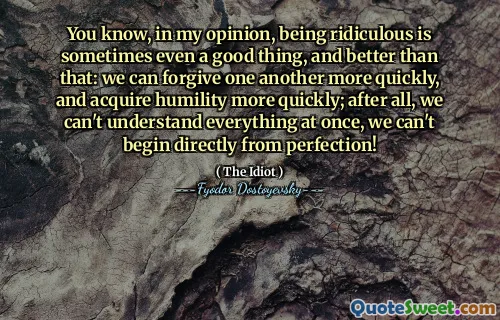
You know, in my opinion, being ridiculous is sometimes even a good thing, and better than that: we can forgive one another more quickly, and acquire humility more quickly; after all, we can't understand everything at once, we can't begin directly from perfection!
This quote offers a profound outlook on the imperfections inherent in human nature and the importance of embracing our flaws. It suggests that embracing one's own ridiculousness—or human fallibility—is not just acceptable but beneficial. By accepting that no one is perfect, we foster a more compassionate attitude towards ourselves and others. This humility allows us to forgive quickly, recognizing that everyone is in a process of growth and learning. The acknowledgment of imperfection serves as a reminder that perfection is an illusion, and our pursuit should be rooted in progress rather than flawlessness.
In a society often obsessed with perfection and success, this perspective encourages us to loosen our rigid standards and accept ourselves and others as we are. Doing so reduces shame and promotes empathy, leading to healthier relationships and a more tolerant community. The idea that being ridiculous can be a positive trait underscores the importance of authenticity—allowing space for humor, vulnerability, and sincerity without fear of judgment.
Furthermore, this mindset promotes patience and resilience. When we accept our imperfections, we become more forgiving of others' shortcomings, recognizing that everyone is on a journey of self-improvement. The recognition that understanding all aspects of life simultaneously is impossible helps cultivate humility. It reminds us that part of wisdom is knowing when to accept uncertainty rather than futilely striving for absolute knowledge or perfection. Overall, the quote celebrates humility, compassion, and the value of embracing human imperfection as a pathway to better understanding, forgiveness, and personal growth.
*---Fyodor Dostoyevsky---'



